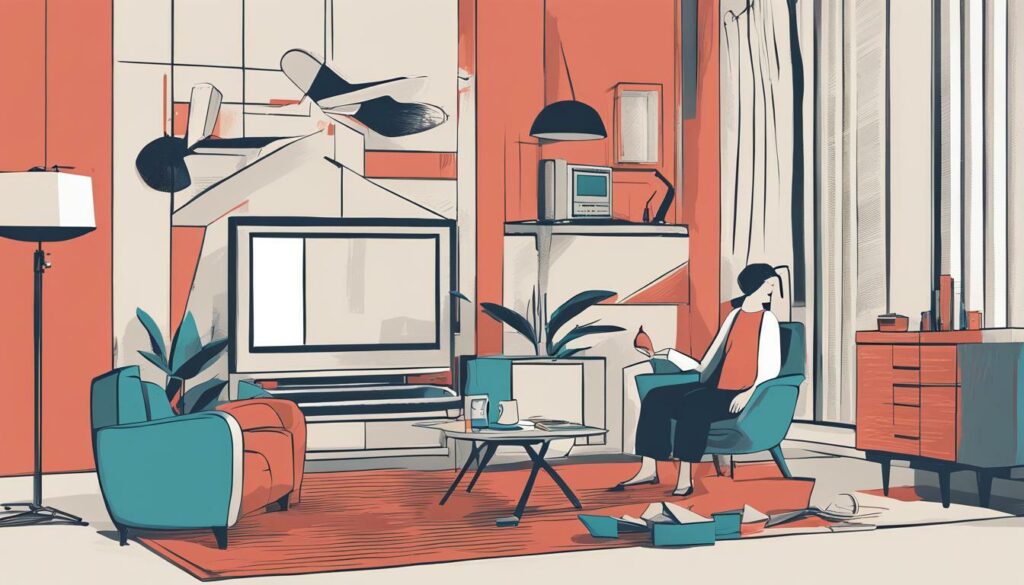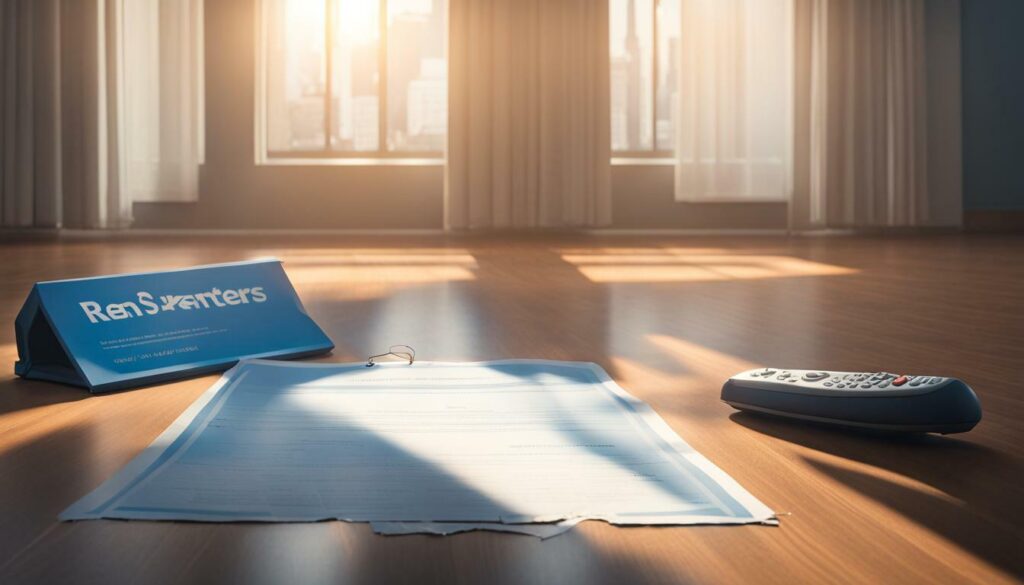If you’re renting a home or apartment, it’s important to protect your personal belongings and yourself with renters insurance coverage. But did you know that renters insurance has two main parts? Understanding each part and what they cover can help you select the right policy and ensure you have adequate protection.
The two main parts of renters insurance are personal property coverage and liability coverage. Personal property coverage helps protect your personal belongings, while liability coverage can protect you in case someone is injured or their property is damaged while on your rental property.
Key Takeaways:
- Renters insurance has two main parts: personal property coverage and liability coverage.
- Personal property coverage protects your personal belongings, while liability coverage can protect you in case of injuries or damages on your rental property.
Renters Insurance Coverage Explained
If you’re a renter, having renters insurance coverage is crucial to protect yourself and your personal belongings. A renters insurance policy is a contract between you and the insurance company that outlines the coverage you will receive in the event of a covered loss.
Generally, renters insurance coverage includes two main parts: personal property coverage and liability coverage. Personal property coverage protects your personal belongings, while liability coverage protects you against claims of bodily injury or property damage that you may be responsible for.
Your renters insurance policy will outline the specific coverage you have, including any deductibles, limits, and exclusions. It’s important to carefully review your policy to ensure you understand your coverage fully.


When selecting a renters insurance policy, be sure to consider the coverage limits, which are the maximum amount the insurance company will pay out for a covered loss. It’s important to select appropriate limits for your needs, as coverage that is too low may not adequately protect you in the event of a loss.
Additionally, renters insurance premiums may vary based on a variety of factors, including your location, the value of your personal property, and your coverage limits. Understanding these factors can help you make informed decisions about your policy and potentially lower your premiums.
Renters Insurance Coverage Explained
Personal property coverage is the first part of a renters insurance policy. It typically covers your personal belongings, such as clothing, electronics, furniture, and other personal items, in the event of a covered loss. Coverage limits for personal property may vary, so it’s important to review your policy to ensure you have adequate coverage for your needs.
Liability coverage is the second part of a renters insurance policy. This coverage protects you against claims of bodily injury or property damage that you may be responsible for. For example, if someone is injured in your rental property, liability coverage may help cover their medical expenses. It’s important to review your policy to understand the specific liability coverage you have and any exclusions that may apply.
Understanding renters insurance coverage is key to ensuring you have the protection you need in the event of a covered loss. By selecting appropriate coverage limits and reviewing your policy carefully, you can have peace of mind that you and your personal belongings are covered.
Part 1: Personal Property Coverage
Personal property coverage is the first part of your renters insurance policy. It protects your personal belongings, such as furniture, electronics, and clothing, from covered perils such as theft, fire, and water damage. It’s important to note that personal property coverage typically has limits that you should be aware of.
| Coverage Type | Limit |
|---|---|
| Electronics | $2,000 |
| Jewelry | $1,500 |
| Furniture | $20,000 |
These limits vary from policy to policy, so it’s important to review your coverage and ensure that it’s adequate for your needs. If you have high-value items, such as expensive jewelry or artwork, you may need additional coverage.
If you’re unsure about your coverage limits, your insurance agent can provide guidance. You should also keep an inventory of your personal belongings, including receipts and photos, to help ensure that you have adequate coverage in case of a covered loss.


It’s important to note that renters insurance does not cover damage to the rental property itself. That falls under the landlord’s insurance policy. Personal property coverage only applies to your personal belongings within the rental unit.
Why You Need Personal Property Coverage
Personal property coverage is essential because it helps protect you financially in case of a covered loss. Without this coverage, you would be responsible for replacing all of your belongings out of pocket, which could be a significant financial burden.
Additionally, personal property coverage can provide peace of mind, knowing that your belongings are protected from unexpected events such as theft, fire, or water damage.
Overall, personal property coverage is a crucial part of renters insurance, and it’s important to review your policy and ensure that you have adequate coverage.
Understanding Deductibles and Premiums
When it comes to renters insurance, deductibles and premiums are two important terms to understand. Put simply, your deductible is the amount you agree to pay out of pocket before your insurance kicks in to cover the rest of the cost of a claim. Meanwhile, your premium is the amount you pay each month or year to maintain your coverage.
Typically, a higher deductible will result in a lower premium, while a lower deductible will result in a higher premium. This is because the higher deductible means you are taking on more financial risk in the event of a claim, which means the insurance company is taking on less risk and can charge you less for coverage.
On the other hand, a lower deductible means the insurance company is taking on more risk, which results in a higher premium for you. It’s important to find a balance between the two that works for your budget and your level of risk tolerance.
When selecting a renters insurance policy, make sure you understand the deductible and premium amounts. You might be tempted to opt for a high deductible to save on your premium, but keep in mind that this could end up costing you more in the long run if you need to file a claim and can’t afford the deductible.
Overall, understanding deductibles and premiums is crucial for making informed decisions about your renters insurance coverage. Take the time to review your policy and consider your options carefully.


Part 2: Liability Coverage
Liability coverage is the second part of renters insurance that you should be familiar with. This type of coverage protects you from financial liability if you or someone else covered under your policy accidentally damages someone else’s property or injures someone while they’re on your rental property.
For example, if a fire started in your apartment and spread to your neighbor’s unit, damaging their belongings, your liability coverage would kick in to help cover the cost of their damages. Similarly, if someone trips and falls in your rental home and gets injured, your liability coverage would help cover their medical expenses.
It’s important to note that liability coverage typically does not cover intentional acts of harm or injuries caused by pets. However, you may be able to purchase additional coverage for these situations.
When choosing liability coverage, it’s important to consider how much coverage you need. Standard liability coverage limits typically start at $100,000, but you may want to consider increasing your coverage if you have significant assets that are at risk in a liability claim.
Remember, liability coverage can protect you from financial ruin in the event of an accident or injury on your rental property, so it’s important to make sure you have adequate coverage.


Additional Living Expenses Coverage
Another coverage option that is often included in renters insurance policies is coverage for additional living expenses. If your rental becomes uninhabitable due to damage from a covered event, this coverage can help pay for expenses such as temporary housing, food, and other necessary costs while your rental unit is being repaired.
It’s important to note that this coverage usually has limits and may only cover expenses that exceed your normal living expenses. Additionally, there may be specific requirements for what qualifies as “uninhabitable” so it’s crucial to review your policy and understand the terms and conditions surrounding this coverage.


If you live in an area prone to natural disasters or other events that could potentially make your rental uninhabitable, additional living expenses coverage can provide peace of mind and financial protection in case the unexpected happens.
Understanding Coverage Limits
When it comes to renters insurance, coverage limits refer to the maximum amount of money your policy will pay out for a covered loss. It is important to understand this aspect of your insurance policy to avoid any surprises or disappointments in the event of a claim.
Your coverage limits will be outlined in your insurance policy, so it is essential that you review it carefully to ensure that you have the appropriate level of coverage for your needs. Keep in mind that if you are underinsured, you may not receive enough compensation to fully replace your damaged or stolen items.
Factors that may impact your coverage limits include the type of coverage you have, the value of your personal property, and your deductible amount. Some insurance providers may offer optional coverage add-ons that can increase your coverage limits for specific items, such as jewelry or electronics.
| Tip: | Consider creating an inventory of your personal property and estimating their value to help you determine the appropriate coverage limits for your policy. |
|---|
It is also worth noting that coverage limits can vary depending on the type of loss you experience. For example, personal property coverage limits may differ from liability coverage limits.
Overall, it is crucial to carefully review your insurance policy to understand your coverage limits and ensure that they align with your needs and expectations.


Personal Liability Coverage Explained
Personal liability coverage is a crucial part of renters insurance that you should understand well. This coverage protects you from financial losses resulting from lawsuits filed against you for bodily injury or property damage that you are responsible for or caused by negligence or accidents.
Without personal liability coverage, you could be held personally liable for any damages or medical expenses incurred by someone who gets injured while on your property or if you accidentally cause damage to someone else’s property. In such cases, you could be required to pay thousands of dollars in compensation out of your pocket, which can be financially devastating.
Most renters insurance policies provide personal liability coverage with a standard limit of $100,000, but you can choose to increase or decrease this limit based on your needs and budget. If you own valuable assets or properties, it is recommended to opt for a higher coverage limit to protect your assets.
What Does Personal Liability Coverage typically include?
Personal liability coverage typically includes:
- Legal defense costs, including court fees and attorney fees
- Medical expenses of the injured party, up to the policy limit
- Compensation for property damage caused by you or your family members
Note that personal liability coverage does not typically cover intentional acts or criminal activities, so it’s essential to always act responsibly and within the law.
It’s important to carefully read your renters insurance policy to understand the specifics of your personal liability coverage and ensure that it aligns with your needs and expectations. If you have any doubts, it’s always advisable to consult your insurance agent or seek legal advice.


Now that you understand personal liability coverage, you can make informed decisions about your renters insurance policy and protect yourself from financial disasters. Remember, accidents can happen to anyone, so it’s better to be prepared with the right coverage.
Factors That Affect Renters Insurance Premiums
When it comes to renters insurance, one of the most critical factors to consider is the premium. The premium is the amount you pay for your policy, usually on a monthly or annual basis. The amount you pay will depend on several factors, including:
| Factor | Description |
|---|---|
| Location | Where you live can have a significant impact on your renters insurance premium. If you live in an area with a high crime rate or a high risk of natural disasters, you may pay more for your policy. |
| Deductible | Your deductible is the amount you pay out of pocket before your insurance coverage kicks in. Choosing a higher deductible can lower your premiums, but it also means you’ll pay more out of pocket in the event of a claim. |
| Coverage Limits | The more coverage you have, the higher your premiums will be. It’s essential to choose coverage limits that are appropriate for your needs. |
| Credit Score | Many insurance companies consider your credit score when determining your premium. Maintaining a good credit score can help keep your renters insurance premiums down. |
| Previous Claims | If you’ve made previous claims under renters insurance, you may pay a higher premium. Insurance companies may see you as a higher risk. |
Keep in mind that these factors can vary from insurer to insurer, and some companies may weigh certain factors more heavily than others. If you’re looking to lower your premium, consider raising your deductible, reducing your coverage limits, and maintaining a good credit score.


Reviewing Your Policy: Understanding the Fine Print
Before signing up for renters insurance, it’s important to carefully review the policy to fully understand your coverage. Make sure you take the time to read through the fine print so you know what your policy does and doesn’t cover.
Be aware of any exclusions or limitations, such as coverage limits or deductibles, that could impact your ability to file a claim. It’s also important to note any specific requirements or conditions that must be met in order for coverage to apply.
When reviewing your policy, pay attention to the types of events or damages that are covered, as well as any additional coverage options that may be available. Consider your specific needs and potential risks when selecting your coverage limits.
Finally, if you have any questions or concerns about your renters insurance policy, don’t hesitate to contact your insurance provider for clarification. It’s better to have a clear understanding of your coverage beforehand rather than being caught off guard in the event of a claim.


Conclusion
Congratulations! By reading this article, you now have a better understanding of the two parts of renters insurance and how they work together to protect you and your belongings. Remember, personal property coverage is there to protect the things you own in case of damage or theft, while liability coverage can protect you if someone is injured in your rental unit or if you cause damage to someone else’s property.
It’s essential to review your policy carefully and make sure you understand all the terms and conditions, including coverage limits, deductibles, and premiums. Don’t hesitate to ask your insurance provider for clarification if you need it.
Stay Protected
Whether you are a first-time renter or a seasoned tenant, having renters insurance is vital for protecting yourself and your belongings. It is always better to be safe than sorry, and renters insurance gives you peace of mind knowing you are covered in the event of unexpected events such as theft, fire or water damage.
So don’t put it off any longer – get renters insurance today and stay protected!
FAQ
Q: What are the two parts of renters insurance?
A: Renters insurance consists of two main parts: personal property coverage and liability coverage.
Q: What does renters insurance coverage include?
A: Renters insurance coverage typically includes protection for personal belongings, liability protection in case someone is injured on your property, and additional living expenses coverage if your home becomes uninhabitable.
Q: What is personal property coverage?
A: Personal property coverage is the part of renters insurance that helps protect your belongings from covered perils such as theft, fire, or vandalism.
Q: What are coverage limits?
A: Coverage limits refer to the maximum amount of money an insurance policy will pay out for covered losses. It is important to review your policy and ensure the coverage limits are sufficient for your needs.
Q: What is liability coverage?
A: Liability coverage is the part of renters insurance that helps protect you if someone is injured on your property or if you cause damage to someone else’s property.
Q: What is additional living expenses coverage?
A: Additional living expenses coverage is a component of renters insurance that can help cover the cost of temporary accommodations, such as a hotel, if your rental becomes uninhabitable due to a covered loss.
Q: How do deductibles and premiums work in renters insurance?
A: Deductibles are the amount you pay out of pocket before your insurance coverage kicks in. Premiums are the regular payments you make to maintain your renters insurance policy.
Q: What factors can affect renters insurance premiums?
A: Several factors can impact your renters insurance premiums, including the location of your rental, the amount of coverage you need, your claims history, and the level of security measures in your rental unit.
Q: Why is it important to review the fine print of a renters insurance policy?
A: Reviewing the fine print of your renters insurance policy is crucial to understanding the specific terms and conditions of your coverage, including any limitations or exclusions that may apply.
Q: Why should I have renters insurance?
A: Renters insurance provides important protection for your personal belongings and liability coverage in case of accidents or damages. It offers peace of mind knowing you’re financially protected in unforeseen situations.







